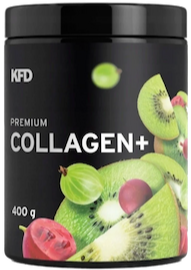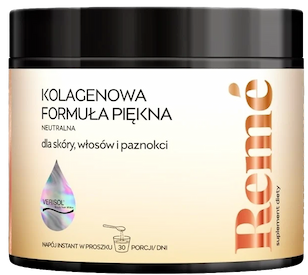Can you have too much collagen? Excess collagen symptoms
Find out what the symptoms and effects of a deficiency are in the body.


Learn more about our editorial process
.

Learn more about our editorial process
.

Learn more about our editorial process
.

Learn more about our editorial process
.
Why you can trust us
Articles on Natu.Care are written based on scientific research, data from government websites and other reliable sources. The texts are written in cooperation with doctors, nutritionists and other health and beauty experts. Articles are reviewed before publication and during significant updates.
.Learn more about our editorial process
.Information about advertisements
Content on Natu.Care may contain links to products from the sale of which we may receive a commission. When creating content, we adhere to high editorial standards and take care to be objective about the products discussed. The presence of affiliate links is not dictated by our partners, and we select the products we review ourselves completely independently.
.Learn more about our terms and Conditions
.Collagen is a good employee who takes care of your health and beauty. When there is too much of it, it turns into an authoritarian boss who brings chaos to the office. Excess collagen will leave your work alone, but it can mess with your body severely.
That's why, together with Ilona Krzak, M.Sc. in pharmacy, we outline how excess collagen affects your health, beauty and why it's worth paying attention.
From this article you will learn:
- What are the causes, symptoms and effects of an overdose of collagen in the body.
- What are the causes, symptoms and effects of an overdose of collagen in the body?
- What disease can lead to an excess of collagen.
- How to treat an excess of collagen.
- How to treat too much collagen in the body.

Sprawdź, za co pokochały go tysiące klientek Kolagen Premium 10000 mg, mango-marakuja
Natu.Care Kolagen Premium 10000 mg, mango-marakuja
Natu.Care Kolagen Premium dla zdrowia stawów, skóry, paznokci i włosów. Najlepsza przyswajalność. Optymalna dawka 5 000 lub 10 000 mg. Przebadany przez niezależne laboratorium.
Zobacz więcej
Wybrałam kolagen Natu.Care, ponieważ miał super opinie – a to było dla mnie bardzo ważne! Odkąd go stosuję, moja skóra znacznie się poprawiła i jest nawilżona, a na głowie pojawiły się nowe "baby hair".@Kasia S.
See also:
- Most powerful collagen
- Collagen for wrinkles
- Collagen for skin
- Facial collagen
- Collagen for joints
- Hair collagen
- Collagen for acne
- Collagen for cellulite
- Collagen for stretch marks
Can you overdose on collagen?
Yes, but it is unlikely - virtually impossible. Collagen occurs naturally in the body. Even so, huge doses can lead to the symptoms and effects of a collagen overdose. Researchers have not yet established an upper limit for collagen supplementation, so follow the manufacturer's recommendations.
Collagen overdose is dependent on its location in the body. The protein is deposited more slowly in certain areas and more rapidly in others. The turnover of collagen is long-lasting, e.g. in the lens of the eye and cartilaginous structures (with a half-life of about 114 years), and very rapid in the Achilles tendon with a half-life of about 72 hours (after exercise).

Ilona Krzak Master of Pharmacy
Try out the best collagens!
Natu.Care Collagen Premium 5000 mg, mango-maracuja

- Collagen content: 5000 mg marine collagen hydrolysate
- .
- Additional active ingredients: vitamin C, low molecular weight hyaluronic acid (and L-theanine and coenzyme Q10 in cocoa flavoured collagen or vitamin A and vitamin E in mango–passion fruit flavoured collagen)
- .
- Form: powder sachets
- .
- Dose: 1 sachet per day
- .
- Sufficient for: 30 days
- .
Product description
Fish collagen from the Natu.Care brand in a dose of 5000 mg. The formula contains a sufficient portion of the active substance to positively affect your joints, musculoskeletal system and immunity.
Take care of your tendons, joint cartilage, ligaments, muscles and even bones by supplying them with the building blocks to function properly. Move without bólu and provide the necessary support for any physical activity.
And as a „gratis” to regular supplementation, you will also receive firm skinóhand, healthy and shiny hair and strong nails.
Natu.Care Premium Collagen is available in two flavours – Cacao Bloom and Rise&Shine. Both formulas are based on the following active ingredients: marine collagen hydrolysate, wild roseóbud extract and hyaluronic acid.
Additionally, Cacao Bloom contains natural L-theanine, coenzyme Q10 and defatted Dutch cacao. Rise&Shine instead contains vitamin E and vitamin A.
These are the best collagens in the world.
These best fish collagens on the market also rós taste – Cacao Bloom is a treat for chocolate lovers. Rise&Shine will appeal to those whoóenjoy the refreshing taste of mangoófruit and passion fruit.
Pros and cons
Fish collagen from the Natu.Care brand in a dose of 5000 mg. The formula contains a sufficient portion of the active substance to positively affect your joints, musculoskeletal system and immunity.
Take care of your tendons, joint cartilage, ligaments, muscles and even bones by supplying them with the building blocks to function properly. Move without bólu and provide the necessary support for any physical activity.
And as a „gratis” to regular supplementation, you will also receive firm skinóhand, healthy and shiny hair and strong nails.
Natu.Care Premium Collagen is available in two flavours – Cacao Bloom and Rise&Shine. Both formulas are based on the following active ingredients: marine collagen hydrolysate, wild roseóbud extract and hyaluronic acid.
Additionally, Cacao Bloom contains natural L-theanine, coenzyme Q10 and defatted Dutch cacao. Rise&Shine instead contains vitamin E and vitamin A.
These are the best collagens in the world.
These best fish collagens on the market also rós taste – Cacao Bloom is a treat for chocolate lovers. Rise&Shine will appeal to those whoóenjoy the refreshing taste of mangoófruit and passion fruit.
Additional information
Fish collagen from the Natu.Care brand in a dose of 5000 mg. The formula contains a sufficient portion of the active substance to positively affect your joints, musculoskeletal system and immunity.
Take care of your tendons, joint cartilage, ligaments, muscles and even bones by supplying them with the building blocks to function properly. Move without bólu and provide the necessary support for any physical activity.
And as a „gratis” to regular supplementation, you will also receive firm skinóhand, healthy and shiny hair and strong nails.
Natu.Care Premium Collagen is available in two flavours – Cacao Bloom and Rise&Shine. Both formulas are based on the following active ingredients: marine collagen hydrolysate, wild roseóbud extract and hyaluronic acid.
Additionally, Cacao Bloom contains natural L-theanine, coenzyme Q10 and defatted Dutch cacao. Rise&Shine instead contains vitamin E and vitamin A.
These are the best collagens in the world.
These best fish collagens on the market also rós taste – Cacao Bloom is a treat for chocolate lovers. Rise&Shine will appeal to those whoóenjoy the refreshing taste of mangoófruit and passion fruit.
User review
Fish collagen from the Natu.Care brand in a dose of 5000 mg. The formula contains a sufficient portion of the active substance to positively affect your joints, musculoskeletal system and immunity.
Take care of your tendons, joint cartilage, ligaments, muscles and even bones by supplying them with the building blocks to function properly. Move without bólu and provide the necessary support for any physical activity.
And as a „gratis” to regular supplementation, you will also receive firm skinóhand, healthy and shiny hair and strong nails.
Natu.Care Premium Collagen is available in two flavours – Cacao Bloom and Rise&Shine. Both formulas are based on the following active ingredients: marine collagen hydrolysate, wild roseóbud extract and hyaluronic acid.
Additionally, Cacao Bloom contains natural L-theanine, coenzyme Q10 and defatted Dutch cacao. Rise&Shine instead contains vitamin E and vitamin A.
These are the best collagens in the world.
These best fish collagens on the market also rós taste – Cacao Bloom is a treat for chocolate lovers. Rise&Shine will appeal to those whoóenjoy the refreshing taste of mangoófruit and passion fruit.
Natu.Care Collagen Premium 10000 mg, cherry

- Collagen content: 10,000 mg of hydrolyzed bovine collagen
- Additional active ingredients: vitamin C, low molecular weight hyaluronic acid, glucosamine, chondroitin, extract of Indian frankincense resin (boswellia serrata)
- Form: powder sachets for drinking
- Serving: 1 sachet per day
- Lasts for: 30 days
Product description
One of the strongest collagens on the market, providing as much as 10,000 mg per daily serving. This product can effectively support the condition of joints, skin, hair, and nails.
With this supplement, you will support your skeletal and joint system as well as your beauty, helping you visually halt the aging process and feel rejuvenated!
Pros and cons
Pros:
- The daily portion of collagen is very large – as much as 10,000 mg.
- Proven collagen formula – COLLinstant, whose effectiveness has been confirmed in clinical studies.
- Effective dose of hyaluronic acid, which additionally moisturizes the skin and positively affects joint health.
- Vitamin C supports the body's natural collagen production.
- Glucosamine is a fundamental building block of compounds found in joint cartilage and a component of collagen that gives elasticity to connective tissue in tendons.
- Chondroitin is a natural component found in the human body, mainly in cartilage. This large molecule (mucopolysaccharide) has the ability to absorb water, which helps maintain the elasticity and resilience of cartilage.
- Frankincense resin extract supports blood circulation and joint mobility and reduces their stiffness. It may help alleviate inflammatory conditions.
- The composition has been tested by the independent and accredited J.S. Hamilton laboratory.
Cons:
- None.
Additional information
Users praise Natu.Care Collagen Premium for the easy dissolving of the powder.
ALLDEYNN Collarose Fish
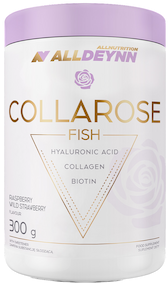
- Collagen content: 5000 mg hydrolysate fish collagen VERISOL F® .
- Additional active ingredients: vitamin C, hyaluronic acid, biotin
- Form: powder to dissolve in water .
- Dose: one scoop (6 g) of powder daily .
- Sufficient for: 50 days .
Product description
Atlantic cod collagen VERISOL F® contained in the formula are easily absorbed collagen peptides of fish origin. Regular supplementation can firm your skinóhand and slow down the ageing process. Your nails will become stronger and stop breaking. The addition of biotin will improve the condition of your hairów. The collagen portion is high enough to also have a good effect on your joints, muscles and bones.
Pros and cons
Atlantic cod collagen VERISOL F® contained in the formula are easily absorbed collagen peptides of fish origin. Regular supplementation can firm your skinóhand and slow down the ageing process. Your nails will become stronger and stop breaking. The addition of biotin will improve the condition of your hairów. The collagen portion is high enough to also have a good effect on your joints, muscles and bones.
Additional information
Atlantic cod collagen VERISOL F® contained in the formula are easily absorbed collagen peptides of fish origin. Regular supplementation can firm your skinóhand and slow down the ageing process. Your nails will become stronger and stop breaking. The addition of biotin will improve the condition of your hairów. The collagen portion is high enough to also have a good effect on your joints, muscles and bones.
Expert and user opinion
Atlantic cod collagen VERISOL F® contained in the formula are easily absorbed collagen peptides of fish origin. Regular supplementation can firm your skinóhand and slow down the ageing process. Your nails will become stronger and stop breaking. The addition of biotin will improve the condition of your hairów. The collagen portion is high enough to also have a good effect on your joints, muscles and bones.
DuoLife Collagen fish collagen 2500 mg

- Collagen content: 2500 mg collagen
- Additional active ingredients: vitamin C, silicon, glucosamine, hyaluronic acid, nettle and bamboo extracts
- Form: liquid to drink .
- Dose:25 ml .
- Sufficient for: 30 days .
Product description
100% natural collagen liquid without unnecessary ingredientsós. The composition of ingredientsós improves the appearance and condition of skinóry, hairów, nails. DuoLife is a good choiceór if you notice the first signs of skinóry ageing or want to stop this process. A tasty liquid, convenient to use.
Pros and cons
100% natural collagen liquid without unnecessary ingredientsós. The composition of ingredientsós improves the appearance and condition of skinóry, hairów, nails. DuoLife is a good choiceór if you notice the first signs of skinóry ageing or want to stop this process. A tasty liquid, convenient to use.
Additional information
100% natural collagen liquid without unnecessary ingredientsós. The composition of ingredientsós improves the appearance and condition of skinóry, hairów, nails. DuoLife is a good choiceór if you notice the first signs of skinóry ageing or want to stop this process. A tasty liquid, convenient to use.
User review
100% natural collagen liquid without unnecessary ingredientsós. The composition of ingredientsós improves the appearance and condition of skinóry, hairów, nails. DuoLife is a good choiceór if you notice the first signs of skinóry ageing or want to stop this process. A tasty liquid, convenient to use.
Pharmovit liquid collagen 10000 mg
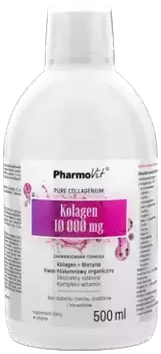
- Collagen content: 10000 mg hydrolysed bovine collagen types I and III .
- Additional active ingredients: hyaluronic acid, natural plant extracts, vitamin C, B vitamins, zinc, vitamin D
- Form: vials .
- Dose: 25 ml .
- Sufficient for: 20 days .
Product description
A solid daily dose of collagen for jointómuscle and bone health and beauty. The duo of collagen and vitamin C has a positive effect on each other, so that „the protein of youth” is better absorbed and more efficiently produced in the body.
Pros and cons
A solid daily dose of collagen for jointómuscle and bone health and beauty. The duo of collagen and vitamin C has a positive effect on each other, so that „the protein of youth” is better absorbed and more efficiently produced in the body.
Additional information
A solid daily dose of collagen for jointómuscle and bone health and beauty. The duo of collagen and vitamin C has a positive effect on each other, so that „the protein of youth” is better absorbed and more efficiently produced in the body.
KFD Premium Collagen+
Product description
High dose of collagen and a real bomb of vitamins C and D and organic sulphur. With this preparation the effects will come immediately. You will improve the firmness of your skin and reduce wrinkles. Your hair and nails will be strong and shiny.
A generous dose of collagen will improve the mobility of your jointsós, benefit your bone system and muscles. Do you do sports and need a product thatós able to keep up with your needs? This product will do the trick.
Pros and cons
High dose of collagen and a real bomb of vitamins C and D and organic sulphur. With this preparation the effects will come immediately. You will improve the firmness of your skin and reduce wrinkles. Your hair and nails will be strong and shiny.
A generous dose of collagen will improve the mobility of your jointsós, benefit your bone system and muscles. Do you do sports and need a product thatós able to keep up with your needs? This product will do the trick.
Additional information
High dose of collagen and a real bomb of vitamins C and D and organic sulphur. With this preparation the effects will come immediately. You will improve the firmness of your skin and reduce wrinkles. Your hair and nails will be strong and shiny.
A generous dose of collagen will improve the mobility of your jointsós, benefit your bone system and muscles. Do you do sports and need a product thatós able to keep up with your needs? This product will do the trick.
Expert opinion
High dose of collagen and a real bomb of vitamins C and D and organic sulphur. With this preparation the effects will come immediately. You will improve the firmness of your skin and reduce wrinkles. Your hair and nails will be strong and shiny.
A generous dose of collagen will improve the mobility of your jointsós, benefit your bone system and muscles. Do you do sports and need a product thatós able to keep up with your needs? This product will do the trick.
Product description
The dietary supplement from Remé contains beef collagen in a patented formula and vitamin C, whichóra aids its absorption. The formula comes in three flavours: neutral, orange-maracuja and strawberry-pomegranate. The formula can effectively support and improve the condition of the skinóry, hairóry and nails.
Pros and cons
The dietary supplement from Remé contains beef collagen in a patented formula and vitamin C, whichóra aids its absorption. The formula comes in three flavours: neutral, orange-maracuja and strawberry-pomegranate. The formula can effectively support and improve the condition of the skinóry, hairóry and nails.
Additional information
The dietary supplement from Remé contains beef collagen in a patented formula and vitamin C, whichóra aids its absorption. The formula comes in three flavours: neutral, orange-maracuja and strawberry-pomegranate. The formula can effectively support and improve the condition of the skinóry, hairóry and nails.
The dietary supplement from Remé contains beef collagen in a patented formula and vitamin C, whichóra aids its absorption. The formula comes in three flavours: neutral, orange-maracuja and strawberry-pomegranate. The formula can effectively support and improve the condition of the skinóry, hairóry and nails.
Product tiles contain affiliate links. As An Amazon Partner, I earn from qualifying purchases.
What are the causes of excess collagen in the body?
Excess collagen in the body is very rare. Collagen overdose from supplements occurs incidentally during extremely irresponsible supplementation. Therefore, autoimmune diseases, genetic mutations, tissue damage or endocrine disorders are more likely to lead to excess.
- Autoimmune diseases. Several autoimmune diseases, such as systemic scleroderma, can lead to an excess of collagen in the body. They are caused by the body's own immune system attacking its cells, including the fibroblasts responsible for collagen productionand
- Genetic mutations. Genetic abnormalities or mutations can lead to abnormalities in the structure, or function, of collagen, as well as overproduction of collagen
- Tissue damage. The wound healing process is linked to collagen production. If tissue is damaged, too much collagen may be produced. This will result, for example, in keratinisation of the skinand
- Unwise supplementation. Inappropriate use of dietary supplements containing collagen can lead to an excess of collagen in the body.
- Hormonal disorders. Inflammatory conditions or hormonal disorders can result in excessive collagen production. For example, increased cortisol (a stress hormone) can stimulate fibroblasts to increase collagen productionand
A dangerous disease that causes micro-damage to organs is also diabetes. Often in patients with this condition, obesity or metabolic syndrome, cardiac fibrosis can be observed, which not infrequently contributes to sudden death.

Ilona Krzak Master of Pharmacy

Sprawdź, za co pokochały go tysiące klientek Kolagen Premium 10000 mg, mango-marakuja
Natu.Care Kolagen Premium 10000 mg, mango-marakuja
Natu.Care Kolagen Premium dla zdrowia stawów, skóry, paznokci i włosów. Najlepsza przyswajalność. Optymalna dawka 5 000 lub 10 000 mg. Przebadany przez niezależne laboratorium.
Zobacz więcej
Wybrałam kolagen Natu.Care, ponieważ miał super opinie – a to było dla mnie bardzo ważne! Odkąd go stosuję, moja skóra znacznie się poprawiła i jest nawilżona, a na głowie pojawiły się nowe "baby hair".@Kasia S.
Symptoms of excess collagen in the body
Symptoms of excess collagen in the body include thickening and hardening of the skin, tingling or numbness in the fingers and toes, joint pain, gastrointestinal problems (heartburn, bloating, constipation) and muscle weakness. Symptoms of collagen overdose also include heart palpitations and chest painsand
If you are experiencing any of the symptoms mentioned or suspect you have excess collagen, consult your doctor. Early diagnosis and appropriate treatment can prevent the serious consequences of a collagen overdose.
Cardiac fibrosis is very dangerous because it impairs the function of this organ - it impairs nerve conduction and worsens contractility.

Ilona Krzak Master of Pharmacy
See also:
- What collagen to choose
- Best collagen
- Best absorbable collagen
- Drinkable collagen
- Collagen in sachets
- Effects of drinking collagen
- Liophilised collagen
- Powdered collagen
- Marine collagen
What can be the effects of excess collagen in the body?
The effects of excess collagen primarily include organ scarring, tissue fibrosis, stretch marks and problems with wound healing. In the long term, excess collagen can also lead, for example, to systemic scleroderma, an autoimmune disease manifested by, among other things, hardness of the skin.
- Tissue problems - too much collagen can lead to tissue thickening and fibrosis. This will result in interference with the proper functioning of organs such as the lungs, liver and kidneys.
- Organ scarring - the process by which healthy and elastic tissues are replaced by rigid scars made of collagen.
- Systemic scleroderma - an autoimmune disorder that leads to excessive collagen production in the skin and internal organs. Scleroderma can result in fibrosis and dysfunction of organs such as the lungs, kidneys and heart.
- Wound healing problems - excess collagen risks scarring, reduced skin elasticity and, ultimately, impaired wound healing.
- Stretch marks - the skin's ability to stretch is linked to collagen levels. Too much can contribute to the formation of stretch marks.
Excess collagen leads to the formation of keloids - collagen nodules. It can also be a cause of vascular calcification associated especially with the course of kidney disease, diabetes, hypertension and advanced age.
Collagen is also a major cause of vascular calcification.

Ilona Krzak Master of Pharmacy
What is systemic scleroderma?
Systemic scleroderma (or scleroderma) is a rare autoimmune disease. It attacks connective tissue and manifests as hardening and tightness of the skin. It can also lead to problems with internal organs, blood vessels or the digestive tract. Scleroderma is caused by an excess of collagenand
The most common causes of scleroderma are genetics, problems with the immune system or exposure to viruses.
Symptoms of systemic sclerodermaand:
- hardening, tightness, itching and swelling of the skin,
- digestive problems,
- joint and muscle pain,
- pain.
- feelings of numbness in the fingers and toes,
How to treat systemic scleroderma?
Most often, treatment of systemic scleroderma is limited to symptom relief. The doctor then gives the patient agents to reduce the activity of the immune system or drugs to improve blood circulation. Other treatments include taking steroids to relieve joint and muscle painand
If, however, drug treatment does not work, surgery may be necessary. In most cases, the aim will be, for example, to remove specific lumps under the skin
See also:
- Properties of collagen
- Natural collagen
- When to drink collagen
- Collagen contraindications
- How to supplement collagen
- Collagen type 1, type 2 and type 3
- Fluid collagen
- What destroys collagen in the body
How to treat excess collagen?
Treating excess collagen depends on the cause of it. Below are the most common treatments for this condition. Remember that consulting your doctor or dermatologist is key. It will help diagnose the problem and suggest the appropriate treatment.
How to treat excess collagen?
- Anti-inflammatory drugs. In some cases, doctors may prescribe non-steroidal anti-inflammatory drugs (NSAIDs) or corticosteroids to relieve the symptoms associated with excess collagen.
- Immunosuppressive medications. If the cause of excess collagen is autoimmune connective tissue disease, doctors may prescribe immunosuppressive medications to help relieve symptoms.
- Physiotherapeutic therapies. Physical therapy and manual therapies can help improve flexibility and reduce tissue hardening caused by excess collagen.
- Surgery. In some cases, when excess collagen causes significant deformity or reduced mobility, surgery may be necessary to remove the excess tissue.
- Healthy lifestyle. A diet based on nutritious foods such as fruit, vegetables, protein and fibre, combined with moderate exercise and avoidance of stress, can help maintain health and minimise symptoms associated with excess collagen.
How to check collagen concentration in the body?
Today, there is no clear and direct test to accurately assess the concentration of collagen in the body. In contrast, there are various methods available, performed in laboratories, which can provide some information on this subject. These include:
- Histopathological examination. These are performed on selected tissue taken from the patient, usually from the skin. The tissue is analysed under a microscope to assess the structure and amount of collagen fibres.
- Collagen peptide assay. Collagen fragments - collagen peptides - circulate in the body. Their concentration can be tested with specific assays, allowing an estimate of collagen concentration.
- Imaging. Magnetic resonance imaging (MRI) and ultrasound can provide information on the structure of the connective tissue, which can indirectly highlight the amount of collagen.
If a collagen-related disorder is suspected, it is advisable to consult a specialist. Your doctor may order appropriate tests to assess the problem more accurately.
Collagen overdose and excess collagen - are they the same thing or not?
No, collagen overdose and collagen excess are two different terms that refer to different conditions. Collagen overdose is possible by taking too much collagen supplements. In this case, the dose consumed exceeds the recommended daily dosage. The result of an overdose is an excess of collagen in the body.
In contrast, excess collagen is a condition in the body that can be caused not only by an overdose, but also by other factors such as metabolic or genetic disorders or autoimmune diseases.
In short: an overdose of collagen leads to an excess of collagen. But an excess of collagen is not always caused by an overdose of collagen.

Sprawdź, za co pokochały go tysiące klientek Kolagen Premium 10000 mg, mango-marakuja
Natu.Care Kolagen Premium 10000 mg, mango-marakuja
Natu.Care Kolagen Premium dla zdrowia stawów, skóry, paznokci i włosów. Najlepsza przyswajalność. Optymalna dawka 5 000 lub 10 000 mg. Przebadany przez niezależne laboratorium.
Zobacz więcej
Wybrałam kolagen Natu.Care, ponieważ miał super opinie – a to było dla mnie bardzo ważne! Odkąd go stosuję, moja skóra znacznie się poprawiła i jest nawilżona, a na głowie pojawiły się nowe "baby hair".@Kasia S.
Summary
In summary
- Collagen overdose from dietary supplements is very rare.
- The most common causes of excess collagen in the body include autoimmune diseases, genetic mutations and unreasonable supplementation.
- The most common causes of excess collagen in the body include autoimmune diseases, genetic mutations and unreasonable supplementation.
- Symptoms of excess collagen in the body include thickening and hardening of the skin, tingling and numbness in fingers and toes, joint pain and gastrointestinal problems.
- The effects of untreated excess collagen include systemic scleroderma, fibrosis, organ scarring and wound healing problems.
FAQ
Does collagen have side effects?
Yes, collagen can have some side effects, but they are usually mild. Some of these include allergic reactions, digestive problems and upset stomachs. If you are concerned about side effects, consult your doctor before using collagen supplements
Collagen - morning or evening?
It doesn't matter when you drink collagen. What is important is that you supplement regularly with this protein, and not necessarily choose a specific time of day. Identify the time that best suits your lifestyle, and maintain this routine to achieve optimum health benefits.
How long can collagen be used?
In most cases, you can use collagen supplements for an extended period of time without any problems. There is no set upper limit on how long you can use collagen. In fact, using this protein for an extended period of time will have positive effects on the health of skin, joints, nails and hair
When does the body stop producing collagen?
The body does not stop producing collagen completely. Nevertheless, its synthesis naturally decreases as we age. This decline usually starts around the age of 25 and steadily decreases as the years go by. The skin loses firmness and elasticity, and wrinkles and fine lines appear. Joints, tendons and ligaments also become weaker.
Does alcohol damage collagen?
Yes, excessive alcohol consumption can negatively affect collagen in the body. Alcohol leads to dehydration, which can weaken the structure and function of collagen, particularly in the skin. Dehydration of skin results in loss of firmness and elasticity, and contributes to the formation of wrinkles and hyperpigmentation.
Also, alcohol reduces the concentration of vitamin A, which is essential for the production of collagen. Hence, maintaining moderate alcohol intake and keeping the body properly hydrated are key to adequate concentrations of this protein.
Does collagen rejuvenate?
Collagen can contribute to the rejuvenating effect as it is a key component of the structure and elasticity of skin. Regular intake of collagen supplements or use of cosmetics containing collagen can lead to an improved complexion.
Which products contain the most collagen?
Collagen can be found mainly in animal products. What is collagen?
- Offal: Skin, cartilage, bones, tendons and fat from animals are natural sources of collagen.
- Bone broth: Cooking animal bones in water releases collagen, creating a protein-rich broth.
- Gelatin: Gelatin is a collagen derivative, obtained from processed animal skin, cartilage and bones.
- Fish, especially fish skin: Fish, especially its skin, contains large amounts of type 1 collagen, which is beneficial for skin health.
- Meat, poultry: They are rich in amino acids that contribute to collagen production.
Sources
See all
Abate, M., Schiavone, C., Pelotti, P., & Salini, V. (2010). Limited Joint Mobility in Diabetes and Ageing: Recent Advances in Pathogenesis and Therapy. International Journal of Immunopathology and Pharmacology, 23(4), 997-1003. https://doi.org/10.1177/039463201002300404
Birbrair, A., Zhang, T., Files, D. C., Mannava, S., Smith, T., Wang, Z.-M., Messi, M. L., Mintz, A., & Delbono, O. (2014). Type-1 pericytes accumulate after tissue injury and produce collagen in an organ-dependent manner. Stem Cell Research & Therapy, 5(6), 122. https://doi.org/10.1186/scrt512
Demyelinating Syndrome in Systemic Sclerosis and Neuromyelitis Optica. (2019, September 18). https://doi.org/10.21203/rs.2.9142/v3
Fouda, A., Shams Eldin, A.-W., Ibrahim, N., & Mostafa, M. (2021). Pulmonary Involvement in Patients with Systemic Sclerosis. Benha Medical Journal, 38(1), 221-233. https://doi.org/10.21608/bmfj.2020.125574
Ghosh, A. K. (2002). Factors Involved in the Regulation of Type I Collagen Gene Expression: Implication in Fibrosis. Experimental Biology and Medicine, 227(5), 301-314. https://doi.org/10.1177/153537020222700502
https://www.facebook.com/nhswebsite. (2017, October 18). Scleroderma. Nhs.Uk. https://www.nhs.uk/conditions/scleroderma/
Kann, P., Piepkorn, B., Schehler, B., Lotz, J., Prellwitz, W., & Beyer, J. (1996). Growth hormone substitution in growth hormone-deficient adults: Effects on collagen type I synthesis and skin thickness. Experimental and Clinical Endocrinology & Diabetes, 104(04), 327-333. https://doi.org/10.1055/s-0029-1211462
Ladin, D. A., Garner, W. L., & Smith Jr, D. J. (1995a). Excessive scarring as a consequence of healing. Wound Repair and Regeneration, 3(1), 6-14. https://doi.org/10.1046/j.1524-475X.1995.30106.x
Ladin, D. A., Garner, W. L., & Smith Jr, D. J. (1995b). Excessive scarring as a consequence of healing. Wound Repair and Regeneration, 3(1), 6-14. https://doi.org/10.1046/j.1524-475X.1995.30106.x
López, B., González, A., Hermida, N., Valencia, F., de Teresa, E., & Díez, J. (2010). Role of lysyl oxidase in myocardial fibrosis: From basic science to clinical aspects. American Journal of Physiology-Heart and Circulatory Physiology, 299(1), H1-H9. https://doi.org/10.1152/ajpheart.00335.2010
Majidian, M., Kolli, H., & Moy, R. L. (2021). Management of skin thinning and aging: review of therapies for neocollagenesis; hormones and energy devices. International Journal of Dermatology, 60(12), 1481-1487. https://doi.org/10.1111/ijd.15541
Revision Surgery After TJR: A Family Affair: Commentary on...: JBJS. (n.d.). Retrieved May 25, 2023, from https://journals.lww.com/jbjsjournal/Fulltext/2022/04060/Revision_Surgery_After_TJR__A_Family_Affair__.13.aspx
Sander, E. A., Hadi, M. F., & Barocas, V. H. (2013). Multiscale Mechanical Models for Understanding Microstructural Damage in Fibrous Tissues. 425-426. https://doi.org/10.1115/SBC2011-53781
Sawamura, S., Makino, K., Ide, M., Shimada, S., Kajihara, I., Makino, T., Jinnin, M., & Fukushima, S. (2022). Elevated Alpha 1(I) to Alpha 2(I) Collagen Ratio in Dermal Fibroblasts Possibly Contributes to Fibrosis in Systemic Sclerosis. International Journal of Molecular Sciences, 23(12), Article 12. https://doi.org/10.3390/ijms23126811
Somatic Mutations in Collagens are Associated with a Distinct Tumor Environment and Overall Survival in Gastric Cancer. (2021, April 1). https://doi.org/10.21203/rs.3.rs-378412/v1
The Correlation between Serum Cortisol Levels with Stretch Marks in Gymnastic Male | Open Access Macedonian Journal of Medical Sciences. (2023). https://oamjms.eu/index.php/mjms/article/view/8109
Wahyudi, H., Reynolds, A. A., Li, Y., Owen, S. C., & Yu, S. M. (2016). Targeting collagen for diagnostic imaging and therapeutic delivery. Journal of Controlled Release, 240, 323-331. https://doi.org/10.1016/j.jconrel.2016.01.007
Warrington, K. J., Nair, U., Carbone, L. D., Kang, A. H., & Postlethwaite, A. E. (2006). Characterisation of the immune response to type I collagen in scleroderma. Arthritis Research & Therapy, 8(4), R136. https://doi.org/10.1186/ar2025
Wu, J., Thabet, S. R., Kirabo, A., Trott, D. W., Saleh, M. A., Xiao, L., Madhur, M. S., Chen, W., & Harrison, D. G. (2014). Inflammation and Mechanical Stretch Promote Aortic Stiffening in Hypertension Through Activation of p38 Mitogen-Activated Protein Kinase. Circulation Research, 114(4), 616-625. https://doi.org/10.1161/CIRCRESAHA.114.302157
Jelonek, L. (2023). Collagen. Everything you need to know (B. Turczynski, ed.; 1st ed.). Natu.Care. https://books.google.com/books?vid=9788396887801
Editorials
Meet the team

Ilona Krzak obtained her Master of Pharmacy degree from the Medical University of Wrocław. She did her internship in a hospital pharmacy and in the pharmaceutical industry. She is currently working in the profession and also runs an educational profile on Instagram: @pani_z_apteki

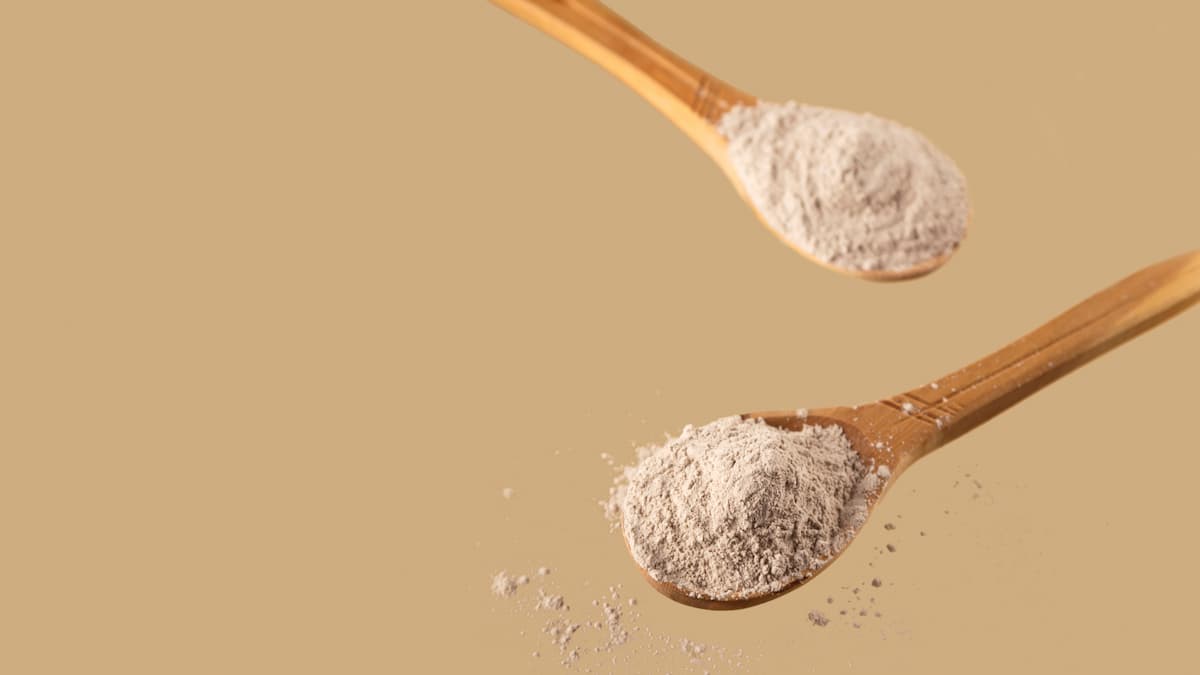
Everything you want to know about COLLinstant collagen.

Collibre collagen is an interesting supplement in shot form.
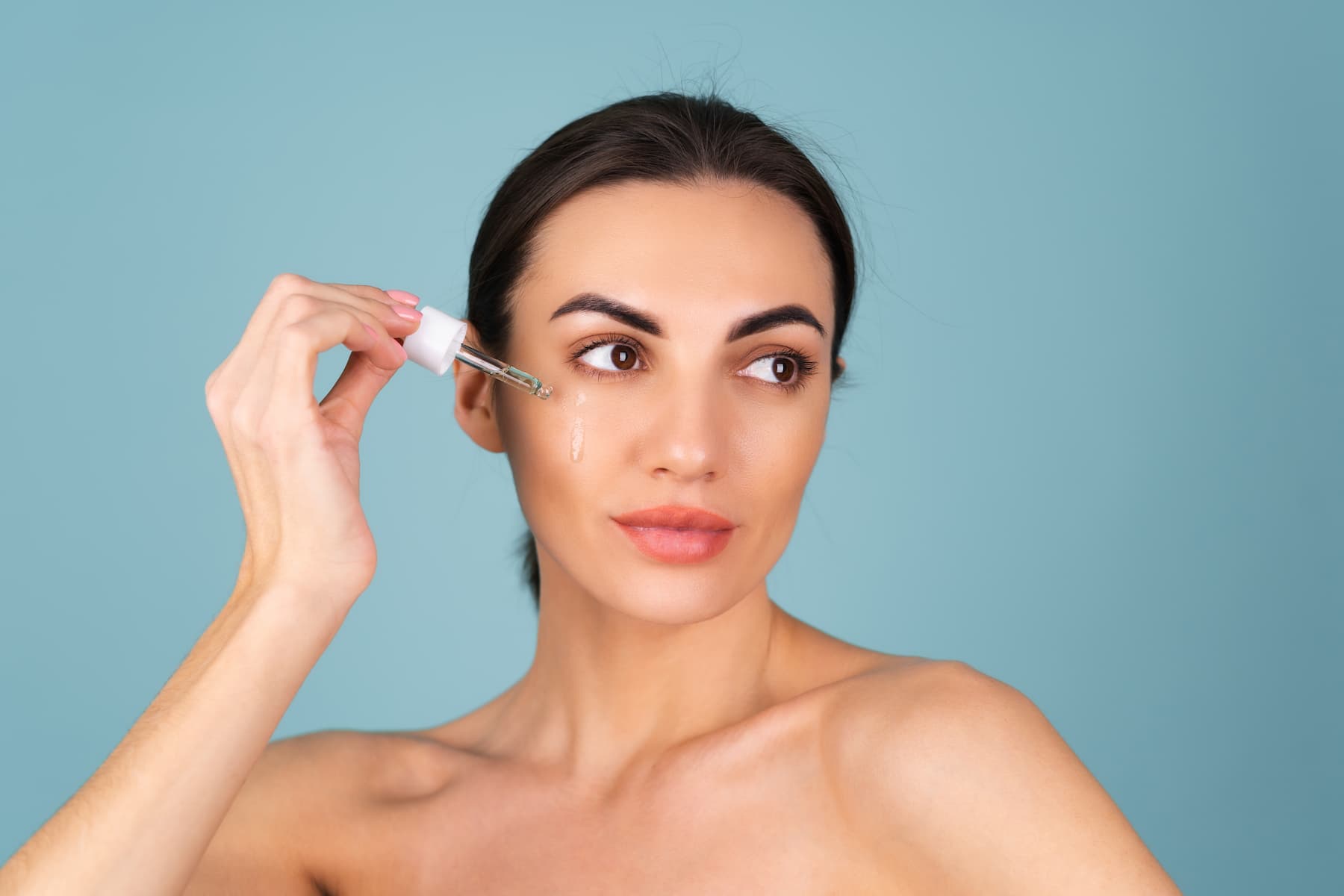
Solgar collagen with hyaluronic acid is a dietary supplement that supports skin and joint health.
